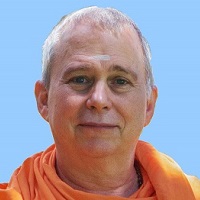
Bhagavad Gita Class (11): Chapter 2 Verse 23-28 | Swami Tadatmananda
“The soul is neither born, nor does it die; it is eternal and unchanging. Just as the body undergoes birth and death, the soul transcends these changes, remaining untouched by the weapons of time.” (Bhagavad Gita 2:20-23)
Swami Tadatmananda dives deep into the profound teachings of the Bhagavad Gita, revealing the unchanging essence of the self, or atma, and its eternal nature that transcends life and death. Join us to uncover the wisdom that not only reminds us of our true self but offers comfort in the face of loss, inspiring us to see beyond the temporary and embrace the everlasting truth of our existence.
Swami Tadatmananda is a traditionally trained teacher of Advaita Vedanta, meditation, and Sanskrit.